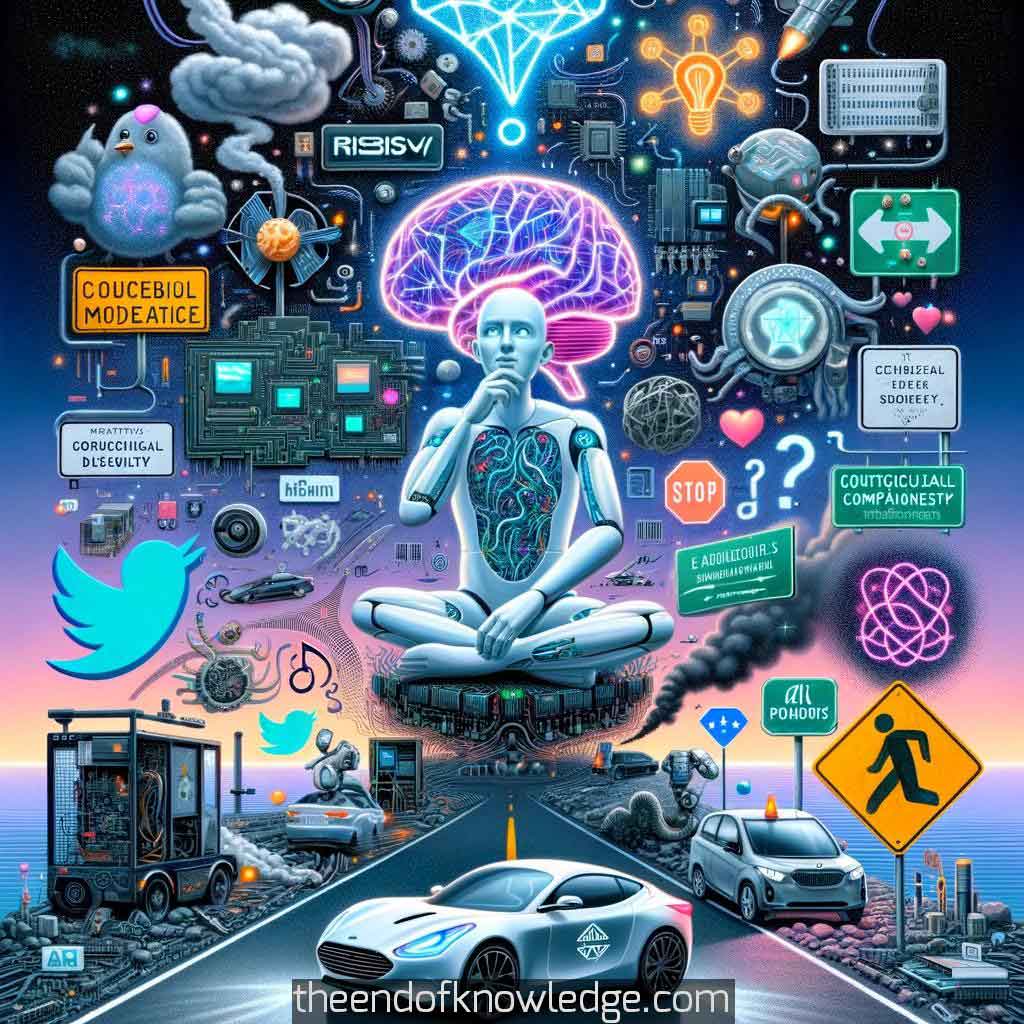 >
>
Concept Graph (using Gemini Ultra + Claude3):
Custom ChatGPT resume of the OpenAI Whisper transcription:
1.- George Hotz discusses the potential end of humanity through excessive entertainment or loss of reproductive interest, highlighting the diversity within humanity and its unpredictable nature.
2.- Hotz, founder of Comma AI and TinyCorp, emphasizes the simplicity and efficiency of TinyGrad, a neural network framework.
3.- Hotz discusses the efficiency of TinyGrad, a minimalistic neural network framework he developed, emphasizing its simplicity and ease of understanding, contrasting it with larger, more complex frameworks which might be less accessible to beginners or those interested in the underlying mechanics of neural networks.
4.- The conversation shifts to Twitter and its potential as a platform for discourse and idea exchange. Hotz expresses concerns over the platform's management and decision-making processes, particularly in relation to content moderation and the impact on free speech.
5.- Hotz shares his views on AI safety, stressing the importance of considering the unintended consequences of AI development. He highlights the challenge in aligning AI systems with human values and the dangers of superintelligent AI surpassing human control.
6.- The discussion moves to self-driving technology, where Hotz critiques the current state of the industry. He emphasizes the gap between the marketing of self-driving capabilities and the actual performance of these systems, pointing out the technological and ethical challenges that remain unaddressed.
7.- Hotz and Fridman delve into the concept of General Purpose Technology (GPT) and its impact on society. Hotz argues that while GPTs like AI can drive significant progress, they also pose risks to employment and societal structures if not managed carefully.
8.- AGI (Artificial General Intelligence) is a topic of interest, with Hotz expressing skepticism about the near-term realization of AGI. He discusses the limitations of current AI models and the complex challenges that need to be overcome to achieve true AGI.
9.- Hotz reflects on the concept of God and spirituality, sharing his personal views on the matter. He discusses the role of faith and religion in providing comfort and meaning to people's lives, while also questioning the interpretations and teachings of organized religions.
10.- The conversation covers Hotz's career journey, from his early hacking achievements to his work in AI and technology. He shares insights into his motivations, challenges, and the lessons learned along the way.
11.- The topic of education and learning is discussed, with Hotz advocating for self-directed learning and critical thinking. He criticizes the traditional education system for its focus on conformity and rote learning, emphasizing the value of curiosity and experimentation.
12.- Hotz explores the intricacies and challenges of AI hardware acceleration, emphasizing the importance of software over hardware. He predicts a shift towards RISC-V chips due to the complexity of creating effective AI accelerators, highlighting the need for a comprehensive software stack to utilize hardware effectively.
13.- The discussion delves into AMD's challenges in the AI space, notably with the 7900 XTX kernel drivers. Hotz details his experiences with AMD's hardware and software issues, expressing his engagement with AMD's CEO, Lisa Su, to address these concerns, illustrating the critical role of software stability and performance in AI development.
14.- Hotz critiques the current state of AI accelerators, arguing that the diversity of hardware solutions is less significant than the ability to write efficient software. He stresses the necessity of a high-performance software stack for AI development, regardless of the underlying hardware, and discusses his approach with TinyGrad to prioritize software performance on various platforms, including AMD and NVIDIA GPUs.
15.- The conversation shifts to the concept of the "Tiny Box," a powerful computing solution designed by Hotz's TinyCorp. This device aims to offer exceptional deep learning capabilities in a compact form, supporting large language models and AI applications efficiently, illustrating Hotz's vision for accessible, high-performance AI computing.
16.- Hotz shares his perspective on artificial companionship, discussing the challenges of creating virtual partners that meet human emotional and psychological needs. He explores the complexities of human attraction and relationships, questioning the ability of AI to replicate these dynamics, which sparks a broader discussion on the intersection of technology and human intimacy.
17.- The topic of cooling solutions for high-performance computing devices is addressed, highlighting the importance of noise reduction and efficiency in designing systems like the Tiny Box. Hotz's focus on creating a user-friendly experience underscores the technical challenges of balancing performance with practical considerations like noise and form factor.
18.- Hotz emphasizes the importance of open-source culture in AI development, critiquing the closed nature of many AI projects. He advocates for transparency, collaboration, and public development as essential components of a healthy technological ecosystem, reflecting on his experiences and aspirations for TinyCorp's contributions to the field.
19.- The conversation explores the implications of AI in self-driving technology, where Hotz discusses Comma AI's progress in developing autonomous driving solutions. He emphasizes the importance of data-driven policy learning and simulation for advancing self-driving capabilities, illustrating the practical challenges and innovations in the field.
20.- Hotz reflects on the broader societal impacts of AI, discussing the potential for AI to reshape human interaction, creativity, and employment. He speculates on the future of AI safety and ethics, highlighting the need for a balanced approach to innovation that considers both technological potential and human values.
21.- The discussion concludes with an exploration of AI's role in information retrieval and decision-making, envisioning a future where AI assists in navigating the vast amounts of data and knowledge available. Hotz emphasizes the transformative potential of AI in enhancing human capabilities and understanding, while also cautioning against the risks of over-reliance and loss of critical thinking skills.
Interview byLex Fridman| Custom GPT and Knowledge Vault built byDavid Vivancos 2024